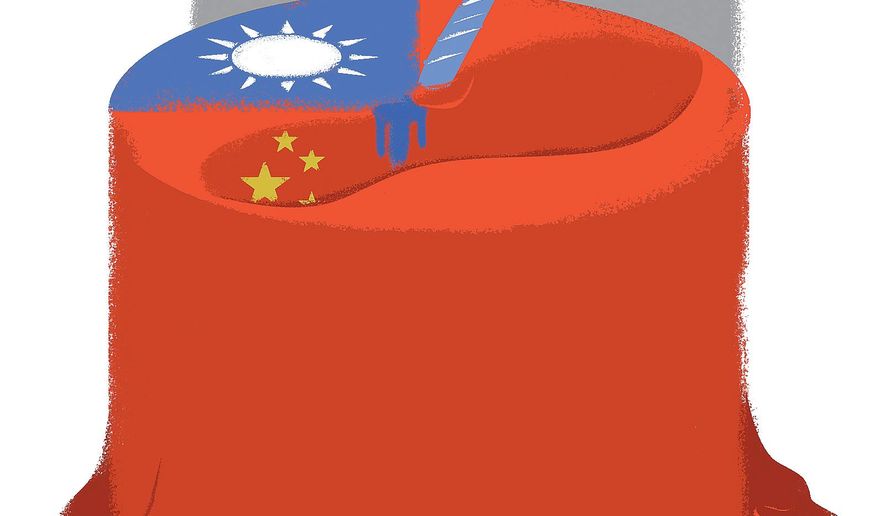OPINION:
Tuesday is Taiwan’s national day (known as Double Ten Day), commemorating the Wuchang Uprising, which led to the establishment of the Republic of China (ROC) in 1912. The Republic of China on Taiwan is the true heir to Sun Yat-sen’s revolution.
Like the late Rodney Dangerfield, Taiwan gets no respect — at least in the world of international diplomacy.
In June, Panama severed diplomatic ties with Taiwan. Since 1970, most countries have opted for Beijing over Taipei, due to a combination of pressure and bribes. China refuses to have diplomatic relations with any nation that officially recognizes Taiwan. Most opt for pragmatism over principal.
The New York Times, the U.S. equivalent of the People’s Daily, could barely contain its glee: “Panama Establishes Ties with China, Further Isolating Taiwan,” read the headline in the June 13 edition.
But Taiwan isn’t isolated, not where it counts. Bilateral trade with the United States was $65.3 billion in 2016, making the ROC our 10th-largest trading partner. According to the International Monetary Fund, Taiwan has the world’s 15th-largest economy (the seventh-largest in Asia). Not bad for a nation of 23 million. Its trade partners are delighted to do business with a country whose existence they won’t officially recognize.
Besides its vibrant economy, Taiwan is one of the few genuine democracies in Asia. Despite its huge economy, the People’s Republic of China (PRC) remains what it was at the end of the civil war in 1949 — a brutal dictatorship ruled by a self-perpetuating oligarchy.
For Taiwan, trying to get along with the people’s republic is like living with a belligerent, bully of a neighbor, never knowing what will set him off.
In her inaugural address last year, Taiwan’s President Tsai Ing-wen infuriated Beijing by not paying lip service to the myth that both the ROC and PRC both are part of something called One China.
On Dec. 5, President-elect Donald Trump took a phone call from President Tsai. It was the first time since we withdrew recognition of the ROC in 1979 (under that foreign policy genius, President Jimmy Carter) that a U.S. president or president-elect spoke directly with the leader of Taiwan.
On one of his famous Twitter forays, Mr. Trump said he didn’t understand the fuss. (“Interesting how the U.S. sells Taiwan billions of dollars of military equipment but I should not accept a congratulatory call.”)
For the president, that 10-minute conversation may have been a calculated move to elicit Chinese cooperation on North Korea and bilateral trade, or it might have been a recognition of Taiwan’s strategic importance. Always friendly to America, the ROC was our ally from World War II until Nixon betrayed it in 1971, and Mr. Carter completed the process in 1979. Still, the United States has far more in common with the island democracy than with the totalitarian mainland.
Whoever controls both sides of the Taiwan Straits can restrict access to one of the busiest energy trade routes in the world. Do we want that control in the hands of an aggressive, highly volatile regime?
Only 20 nations have diplomatic relations with Taiwan. While few in number, they are steadfast in their support.
Risking Beijing’s displeasure, its 15 allies sent a joint letter to United Nations Secretary-General Antonio Guterres urging that Taipei be included in the 2030 Agenda for Sustainable Development and allowed to participate in the U.N. system, including subsidiary bodies like the World Health Organization. They also noted the absurdity of requiring Taiwanese to have a travel permit issued by China to enter U.N. premises.
Beijing believes that time is on its side — that sooner or later, Taiwan must succumb to pressure to reach a settlement that surrenders its sovereignty — and that it will eventually accept something like the deal Hong Kong got in 1997 (One Nation, Two Systems), on which China has repeatedly reneged.
But since the end of martial law and the transition to democracy, the Taiwanese have forged their own identity, one which makes their merger with the mainland impossible.
Liberal media like The New York Times assume that resolving the conflict by grafting the ROC to the PRC would be better for everyone.
It wouldn’t be better for a people whose destiny would be taken out of their hands. It wouldn’t be better for the United States, which would see the end of a government that shares our values. And it would not be better for the world, marking the disappearance of the only Chinese democracy in history.
The course of history often turns on the fate of small countries — Belgium in 1914 and Czechoslovakia in 1938.
And so, let us wish the Republic of China on Taiwan a happy 106th birthday — and many more.
• Don Feder, a former columnist for the Boston Herald, is a freelance writer.




Please read our comment policy before commenting.